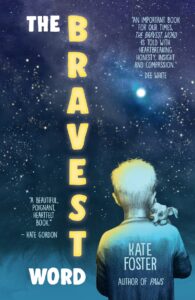Kate Foster, The Bravest Word, Walker Books Australia, May 2022, 240 pp., RRP $17.99 (pbk), ISBN 9781760654719
Awareness and understanding of mental health challenges is increasing in mainstream media and society. Many adults today saw anxiety, depression, addiction, narcissism, and other issues as they grew up, but it was never labelled. Many of the rising generation will witness mental health illnesses in those they love or themselves and fortunately will have a greater chance of identifying what it is and how it can be treated because of this awareness.
The Bravest Word is a late middle-grade/early YA novel featuring a main character named Matthew. Right from the start of the book readers will notice that something is not right with Matthew’s state of mind, perceptions, and self-talk. He doesn’t get the same joy he used to from football or from being with his friends and he certainly doesn’t want to talk to his parents about his feelings.
Matthew exhibits many of the common traits of depression – wanting to spend lots of time alone, wanting to sleep more than is usual, lack of motivation for school, homework, and socialising – but for a long time he can’t recognise this for what it is.
Just as he is about to open up to his father a tragically wonderful thing happens. He finds a sad, neglected dog tied up. There is a note that makes it clear the owner is not coming back. Matthew makes an immediate connection with the dog, who he names Cliff, after his late grandfather who Matthew really misses. At the vet, Cliff is checked out, and yet despite all his mistreatment, he should make a good recovery. Matthew is desperate to keep Cliff. He recognises a long-lost feeling of happiness when he thinks about Cliff. Matthew and Cliff need each other, but will Matthew’s mum see that and let Cliff come home? Can Matthew ever feel happiness and hope again?
This is a serious read for young people. The scene where Cliff is found is quite sad and might distress sensitive readers. It’s interesting that the author has chosen to have the mother be the less understanding, more emotionally unavailable parent in the family whereas the father seems more in tune with Matthew’s limitations and burdens. There will be many teenagers who will see their own experiences and emotions in Matthew’s character and hopefully a book like this might help them feel less alone and more willing to seek out help.
Reviewed by Cherie Bell


